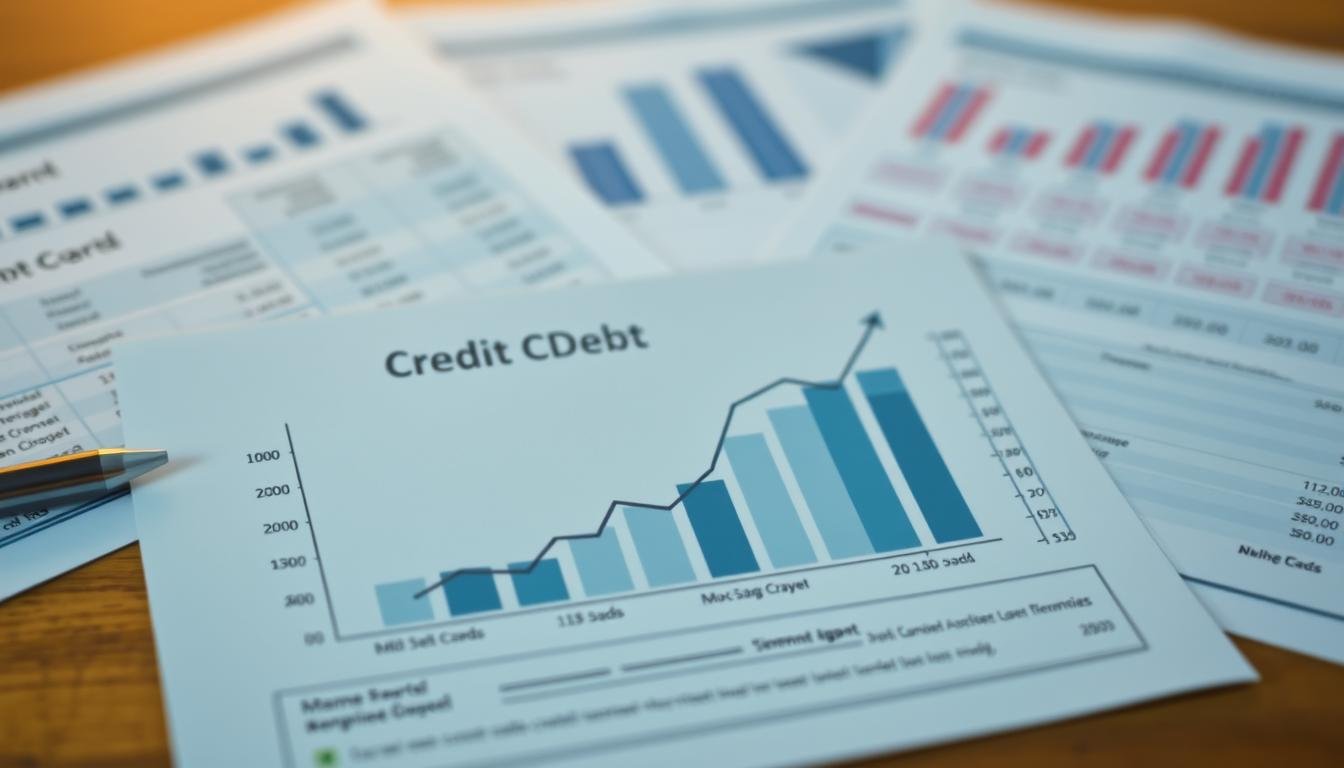Credit Card Debt and Its Impact on Mortgage: When you’re ready to apply for a mortgage, knowing how your current debts affect the process is key. Your financial situation greatly influences whether you’ll get approved for a mortgage.
Outstanding debts can make it harder to get a mortgage. Lenders look at your debt-to-income ratio to see if they should lend to you. If you have too much debt, it can hurt your chances of getting a mortgage.
Knowing how your current financial state might affect your mortgage application is important. By managing your debts well, you can improve your financial health. This can make your mortgage application more likely to succeed.
Contents
- 1 Understanding the Relationship Between Credit Card Debt and Mortgage Applications
- 2 How Does Credit Card Debt Impact Mortgage Approval
- 3 Understanding Debt-to-Income Ratio
- 4 Debt-to-Income Ratio: The Critical Metric
- 5 Credit Utilization and Your Credit Score
- 6 Strategies to Manage Credit Card Debt Before Applying for a Mortgage
- 7 Managing Credit Card Debt for a Successful Mortgage Approval
- 8 FAQ: Credit Card Debt and Its Impact on Mortgage
- 8.1 How does credit card debt affect my mortgage application?
- 8.2 What is a debt-to-income ratio, and how is it calculated?
- 8.3 How can I improve my credit score to enhance my mortgage application?
- 8.4 What strategies can I use to manage credit card debt before applying for a mortgage?
- 8.5 How does credit utilization affect my credit score?
Understanding the Relationship Between Credit Card Debt and Mortgage Applications
Your credit card debt can greatly affect your mortgage approval chances. Lenders see credit card debt as a risk because it might impact your ability to pay the mortgage on time.
When you apply for a mortgage, lenders look at your financial health. They check your credit score, income, and debt. Credit card debt is a big factor because it shows if you manage your money well.
Here are some key factors lenders consider when evaluating mortgage applications:
- Credit score: A good credit score can help balance out credit card debt.
- Debt-to-income ratio: This ratio shows how much of your income goes to debt payments.
- Payment history: Making payments on time can help your mortgage application.
Lenders use these factors to judge the risk of lending to you. High credit card debt can make you seem riskier, making it harder to get a mortgage.
To boost your approval chances, manage your credit card debt well before applying for a mortgage. This means paying down debt, making timely payments, and keeping an eye on your credit score.
How Does Credit Card Debt Impact Mortgage Approval
Credit card debt is key when you apply for a mortgage. Lenders check your financial health, and credit card debt is a big part of this. They want to see if you can handle monthly payments.
Lenders look at your debt-to-income ratio. This shows how much of your income goes to debt, like credit cards. It’s important because it shows if you can manage payments.
A high debt-to-income ratio can hurt your chances of getting a mortgage. If you owe a lot on credit cards, it might look like you can’t afford a mortgage. This is because lenders worry you might not make payments.
Understanding Debt-to-Income Ratio
The debt-to-income ratio is your total debt payments divided by your income. Here’s how it works:
| Debt Type | Monthly Payment |
|---|---|
| Credit Card Debt | $500 |
| Car Loan | $300 |
| Mortgage | $1,500 |
| Total Debt | $2,300 |
For example, if you make $6,000 a month and owe $2,300 in debt, your ratio is about 38.3%. Lenders usually want this ratio to be 36% or less.
Managing your credit card debt can help your mortgage chances. Ways to do this include paying down debt, combining credit card balances, or getting lower interest rates. These steps can make your financial health better.
Knowing how credit card debt affects mortgage approval can help. By managing your debt, you can improve your financial health. This makes it more likely you’ll get a mortgage.
Debt-to-Income Ratio: The Critical Metric
Your debt-to-income ratio is key in deciding if you can get a mortgage. It shows how much you pay each month in debt compared to your income. Lenders look at this ratio to see if you can handle your mortgage payments and other debts.
To figure out your debt-to-income ratio, add up all your monthly debt payments. This includes credit cards, car loans, and student loans. Then, divide this total by your monthly income before taxes. This gives you a percentage.
For example, if you pay $2,000 a month in debt and make $6,000 a month, your ratio is 33.3%. Most lenders want this ratio to be 36% or less. But, some mortgage programs might accept higher ratios.
Keeping your debt-to-income ratio low is important for getting a mortgage. You can do this by paying off high-interest debt and reducing other financial burdens. Here are some tips:
- Pay down high-interest debt to lower your monthly payments.
- Avoid getting new debt before applying for a mortgage.
- Try to make more money to improve your debt-to-income ratio.
By keeping a good debt-to-income ratio and a strong financial profile, you can boost your chances of getting a mortgage. It’s also important to watch your credit score and how much you use your credit. These things affect your debt-to-income ratio and your mortgage chances.
Credit Utilization and Your Credit Score
Your credit utilization ratio is key to your credit score. This score affects your mortgage application. Credit utilization is the percentage of credit you’re using at any time.
Knowing how credit utilization impacts your score is crucial. Credit scoring models look at your usage across all credit cards and revolving accounts. A lower ratio shows lenders you handle debt well.

- Keep your credit utilization under 30%. Aim for less than 10% for top scores.
- Check your credit report often to keep it accurate and current.
- Reduce your debt, especially on high-interest cards, to lower your utilization.
- Don’t close old accounts. It can decrease your available credit and hurt your ratio.
Effective credit utilization management can boost your credit score. This makes you more appealing to mortgage lenders. It can also help you get better interest rates and improve your mortgage approval chances.
Keeping a good credit score needs constant attention to your credit habits. By understanding what affects your score, you can strengthen your mortgage application.
Strategies to Manage Credit Card Debt Before Applying for a Mortgage
Handling credit card debt wisely can greatly improve your chances of getting a mortgage. It’s important to manage your finances well to meet lender standards.
Here are some tips to help you:
- Paying off high-interest debts
- Reducing credit utilization ratio
- Avoiding new credit inquiries
60-90 Days Before Application
In the short term, focus on:
- Paying down credit card balances to below 30% of the credit limit
- Disputing any errors on your credit report
6-12 Months Before Application
For long-term preparation, consider:
- Consolidating debt into lower-interest loans or balance transfer credit cards
- Building a consistent payment history
Effective credit card debt management before applying for a mortgage boosts your financial health. It also makes you more attractive to lenders. By following these strategies, you can greatly increase your mortgage application success.
Managing Credit Card Debt for a Successful Mortgage Approval
Credit card debt is key when it comes to getting a mortgage. Knowing how it affects your chances can help you improve your financial situation.
Keeping your debt-to-income ratio and credit utilization in check is important. Paying off high-interest debt and making payments on time boosts your credit score. This makes you more likely to get a mortgage.
To get a mortgage, work on reducing your credit card debt and keeping your income stable. This not only makes you eligible for a mortgage but also gets you a better interest rate. This can save you money over time.
By managing your credit card debt and improving your financial profile, you’re ready to apply for a mortgage. You’ll know you’ve done everything to make your application successful.
See Also: How to Avoid Foreign Transaction Fees on Credit Cards?
FAQ: Credit Card Debt and Its Impact on Mortgage
How does credit card debt affect my mortgage application?
Credit card debt can hurt your mortgage chances. It raises your debt-to-income ratio. Lenders look at this ratio to see if you can handle monthly payments.
What is a debt-to-income ratio, and how is it calculated?
Your debt-to-income ratio shows how much of your income goes to debt. To find it, divide your total monthly debt by your income. Then, multiply by 100.
How can I improve my credit score to enhance my mortgage application?
Boost your credit score by using less of your credit limit and paying on time. Also, check your credit report for mistakes.
What strategies can I use to manage credit card debt before applying for a mortgage?
To manage debt, pay off high-interest cards first. Consider consolidating debt into lower-interest options. Also, avoid new credit checks 60-90 days before applying.
How does credit utilization affect my credit score?
High credit utilization hurts your score. Aim to keep your ratio under 30% for a healthy score.

